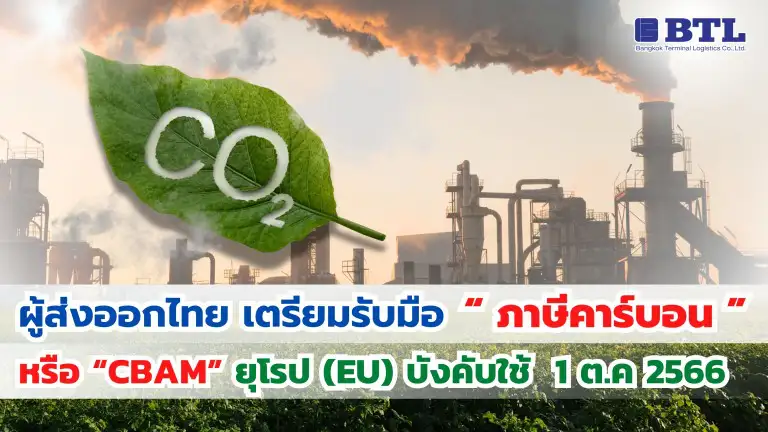Thai Exports Prepare for EU Carbon Tax (CBAM) Starting October 1, 2023
October, 4 2023

Starting from October 1, 2023, the EU will impose a “carbon tax” on imported goods from outside the region. Products with high carbon emissions will face higher taxes, and some may even be banned from entering the EU market.
Initially, the carbon tax applies to six industries with high carbon emissions:
- Steel
- Aluminum
- Cement
- Fertilizers
- Electricity
- Hydrogen
By 2026-2027, the CBAM scope will expand to include chemicals and polymers, and by 2030, it may cover all products. This directly impacts Thai exports, as nearly all production processes generate carbon emissions, including petrochemicals, steel manufacturing, shrimp farming, rice cultivation, and livestock production.
Thai businesses can no longer focus solely on quality; they must also consider environmental costs. Thai exporters must adjust their production processes to reduce greenhouse gas emissions in order to maintain their competitiveness in the EU market.
The Cost of CBAM for Thai Steel Exports
A Kasikorn Research Center report estimated that Thai steel exporters to the EU will face an initial CBAM certificate cost of 1.5-1.7% of the total export value. This translates to additional expenses of 1,338-1,545 THB per ton of steel exported.
Why Is the EU Implementing CBAM?
Climate change is becoming more severe, with frequent storms, floods, and abnormal seasonal changes. The EU’s climate policy aims to reduce net greenhouse gas emissions by 55% by 2030 (compared to 1990 levels) and achieve Net Zero emissions by 2050, in line with the Paris Agreement.
To achieve this, the EU has introduced a carbon credit system. Each industry is allocated a carbon emission quota, and exceeding the limit results in heavy fines.
Since some businesses cannot immediately adapt, the EU Emissions Trading System (EU ETS) allows companies to buy and sell carbon credits. For example, a company that exceeds its carbon allowance can purchase additional credits from another company or from organizations engaged in reforestation projects.
However, as the carbon quota decreases annually, the cost of emissions rises, leading many companies to relocate production outside the EU to countries with looser environmental regulations. These companies then export cheaper goods back to the EU, undercutting local businesses that comply with strict environmental laws.
To prevent this, the EU introduced CBAM to tax imported goods based on their carbon footprint, ensuring that non-EU products meet the same environmental standards. Products that fail to comply may face high tariffs or be restricted from entering the EU market.
How Thai Exporters Should Prepare
The global trend is shifting towards sustainability, with increasing support for clean energy such as:
- Electric vehicles (EVs)
- Solar panels
- Wind energy
- Reusable bags over plastic bags
Thai exporters must adapt quickly by reducing carbon emissions in production, implementing waste management systems, and adhering to international environmental standards.
Although these adjustments will increase production costs, they will help maintain Thailand’s competitiveness in global markets, especially against advanced economies like Japan, China, Singapore, and South Korea, which have stronger green economies. If Thai companies fail to adapt, they risk losing market share.
The Future of Carbon Tax Regulations
According to Oramon Sapthaweetham, Director-General of the Department of Trade Negotiations, key Thai trading partners are preparing to enforce carbon taxes, which will inevitably impact Thai exports.
She urged Thai manufacturers to prepare by:
- Adjusting production processes
- Reducing carbon emissions across the supply chain
- Documenting carbon footprint data for export compliance
The United States is also considering a similar measure, the US Clean Competition Act, which may introduce carbon tariffs by 2026. The US is one of Thailand’s largest export markets, particularly for:
- Seafood
- Canned food
- Seasonings
- Rice
- Garments
- Electronics
By aligning with green business practices, Thai companies can secure long-term competitiveness and capitalize on the growing demand for eco-friendly products.
Opportunities for Green Businesses
The introduction of carbon tax regulations creates new opportunities for green industries, such as:
- Paper straws instead of plastic straws
- Sugarcane fiber food containers instead of styrofoam
- Biodegradable dishwashing liquids
- Plant-based meats and edible insects (as alternatives to traditional livestock farming)
These sustainable products reduce greenhouse gas emissions and offer export potential to the EU and US markets.